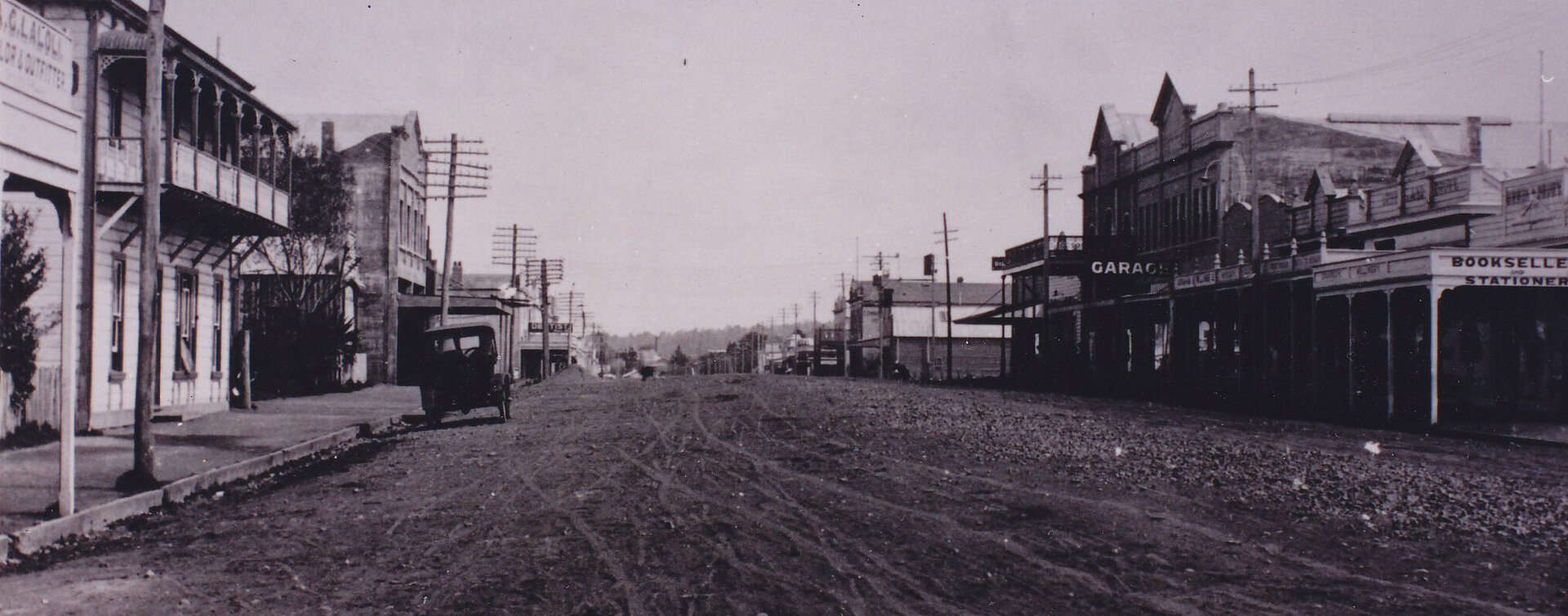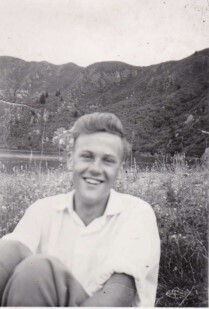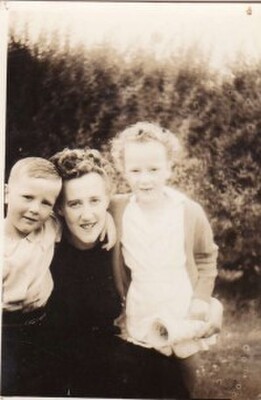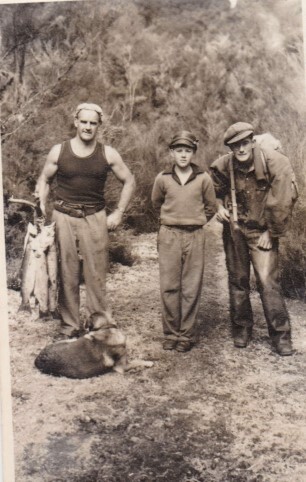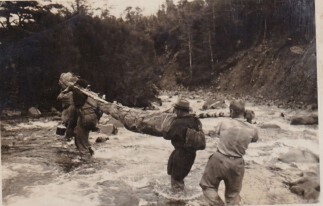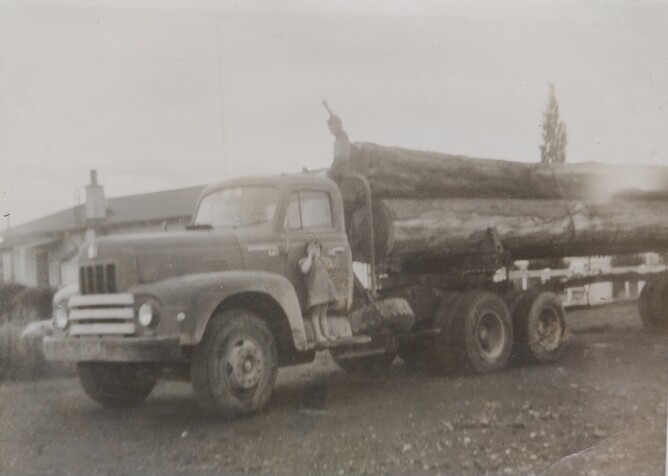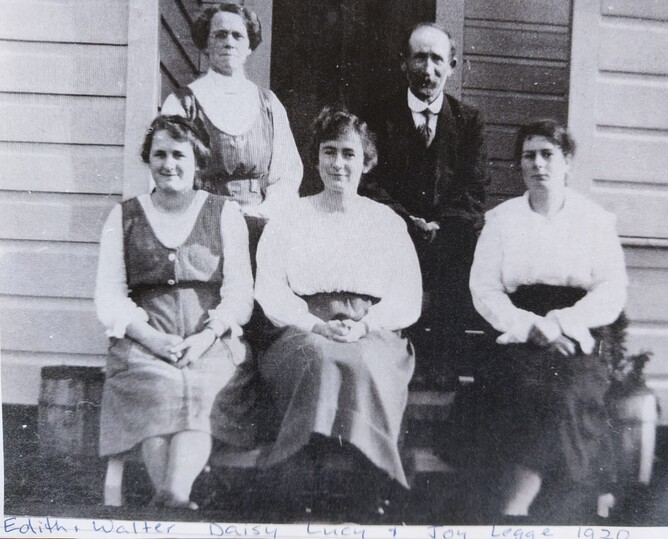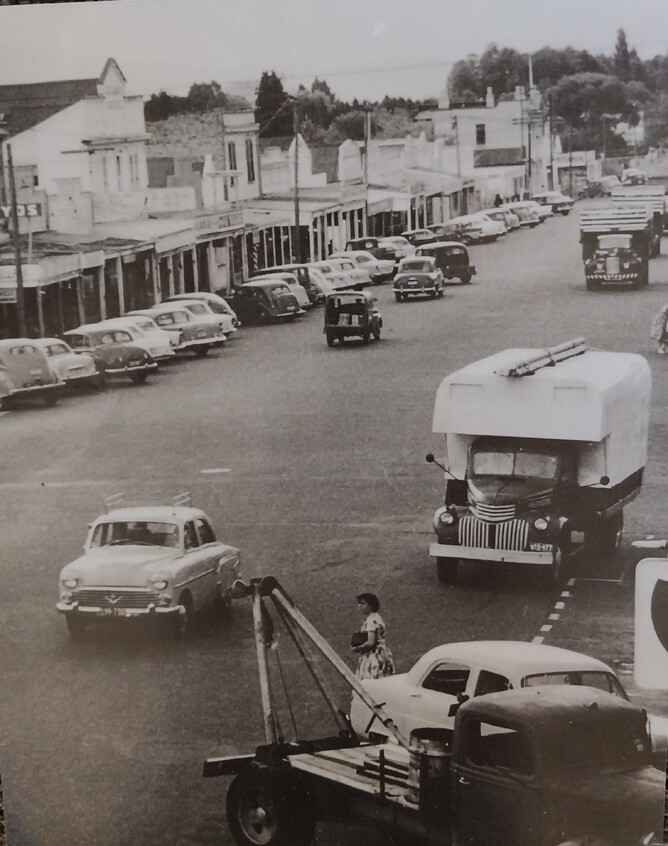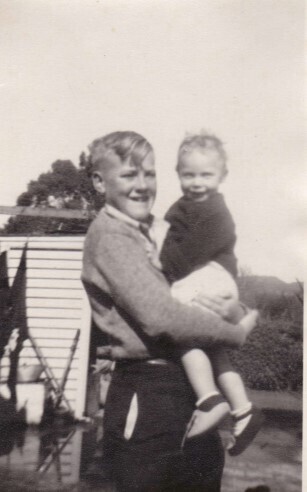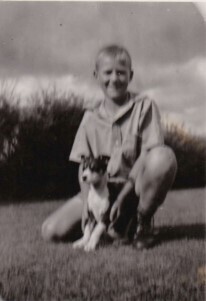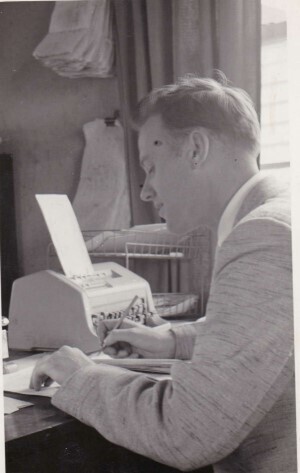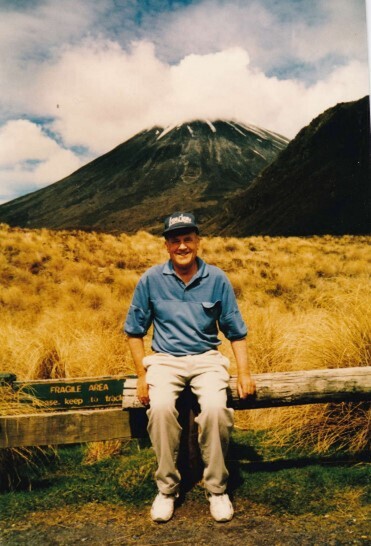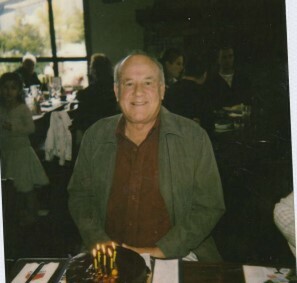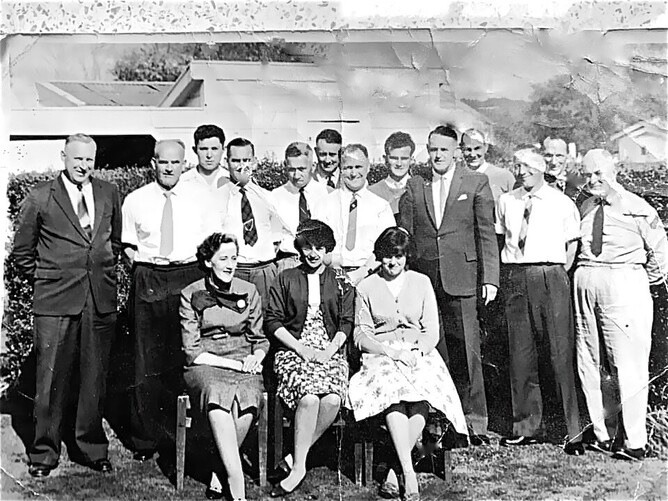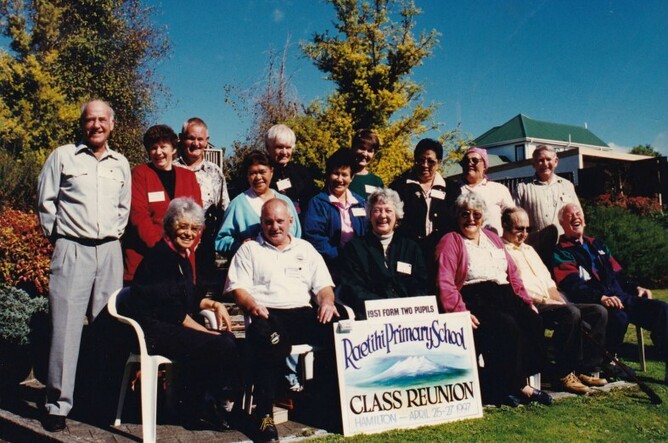Bill Hussey's Memories of Raetihi
My name is William Francis Hussey, I was born in Raetihi on the 30th July 1937 at Ameku Road.
Family
My father’s name was William Francis Hussey also and he was born in Foxton. My mother’s name was Nancy Venice Ciochetto and she was born in Inglewood and the family lived at 1 Ballance Street, Raetihi, which was a state house. All the Ciochetto family lived in Raetihi, and they lived in a little cottage at the bottom of George Street on the right-hand side.
My grandfather, they lived on a farm. He and his family lived on the Waipuna Ridge and when the 1918 fire struck the whole family had to get in the creek to keep away from the flames. That was something my mother told me before she passed on.
Now, my grandfather was Rudolph Jacinto Ciochetto and they nicknamed him Rhubarb Vaselino because he was an iti or Italian, I should say, and they were taking the piss out of him.
In later years my grandad farmed on the corner of Islington Street and Alexander Road on the right-hand side and he milked cows there. He supplied the Raetihi township with milk and also supplied milk to the Chateau, which in those days was a mental asylum during World War 2 days.
WW11
When I was two years old the war broke out and of course my father enlisted and went off to war. There were lots of disruptions in our family. My dad fought at Al Alamein and was also on Crete when the Germans invaded. I was three years old when dad left and four years later, he returned. I was very lucky.
While he was away at the war my mother became very, very ill and was hospitalised for almost the whole time my father was away, so my sister and I were taken in by all sorts of folk in the town and of course I was very thankful for the way we were looked after. I was taken care of by the local doctor and his daughter. His name was Dr Feltham and his daughters name was Sarah and they took care of me for quite some time until my grandmother came to the rescue and she looked after me for the rest of the time while dad was away. My sister was looked after by a Mr Morris Friedlander who used to be the manager of Freeman R Jackson.
When my dad got back from the war there was no place for us to live so my sister continued to live with the Friedlander’s, but my dad and I had to shift into Mrs Windles boarding house which was opposite the Anglican Church. At that time my mum was discharged from hospital, and she was living in a boarding house in the main street in Seddon Street, owned by Mrs Duggan. It was a two- or three-story building. It was not ideal for a family, under any circumstances, so it was pretty tough for everybody.
Finally, my father was allocated a state house in 1 Ballance Street and we all shifted in to start a family for the first time ever. Dad wasn’t too keen on going back to the Post Office after the war, so he started a business as an agricultural contractor, and he top-dressed the farms all the way down the Pipiriki Road and all the way around town by hand. He was a pretty tough sort of a dude!
Fires
I remember a couple of good fires in the township. One was the Raetihi Printing Press which was located in King Street behind the Bank of New Zealand and that caught fire and was virtually burnt to the ground and there was a lot of talk and suspicion relating to that fire.
The other fire was a fire on the Valley Road, about opposite Ranfurly Terrace, across the river, and there was a house owned by a Jack Richards, it went up about 1pm in the morning and was totally burnt to the ground.
Tangiwai Disaster
The Tangiwai Disaster was a huge event in Raetihi. I remember as a kid hearing on Xmas Eve a terrific roar, sounded like the sea, but nobody could work out what it was. In actual fact the crater lake burst and came tearing down the side of Mt Ruapehu. My father and I went out to the Tangiwai disaster at the scene. You weren’t allowed to go past Karioi by car in those days, so we walked from Karioi down the railway track till we got to the bridge. What a mess it was. There were carriages strewn everywhere, people everywhere, even the engine was still warm. It was a horrific sight.
Our family were particularly worried about my sister because she was supposed to be on the train and as it so happened, she wasn’t on it. She was a naughty girl and never ever let us know that she wasn’t on the train. We worried ourselves to bits over it.
Plane Crashes
Labour weekend 1947 a Lockheed Electra aeroplane crashed on Mt Ruapehu into the Mangaturatura Valley. There were 13 people on board, and no one survived it. They hunted for the plane for about a week and finally found it up on the mountain. When my father heard about this, he hopped on his push bike and rode right over to the Ohakune Junction and walked up to Blyth Hutt. Next morning, he set out to the Mangaturatura Valley and was one of the first ones to arrive at the crash scene.
He also helped in the recovery of the bodies which were all strapped into the plane. They had no helicopters in those days, so they strapped them on white pine poles, strapped them in parachutes, which were used to drop food and stuff like that to the men on the ground. They wrapped the bodies up in the parachutes and took them down to Downs Track which was an old milling track and they put them on an old mill train and took them down to Horopito.
During the war there was another plane crash that nobody will remember very much, but it was an aeroplane that got lost in the early hours of in the morning. It was flying over Ohakune and Raetihi area and all the locals got in their cars. They went out to the Waimarino Golf Club and shone their lights on the fairway and the plane came down with several fellas onboard and they crash landed the plane at the Waimarino Golf course and everyone got out of it alive.
The A & P Show
The A & P Show was of course an annual event and us kids used to love going down there with all the side shows, everyone screaming and yelling and yah know “throw the ball” while the clown opens his mouth, “come and see the performing pigs and the clever monkeys” and there were Ferris wheels there and the Wall of Death. A fella riding a motorbike, and it was a great occasion for us kids and of course there was the buck jumping and Harrold Windle was one of the participants and another fella, Kenny McKay, his name was, and he actually got killed on a horse down the Pipiriki Road when it walked over the side of a bluff.
I remember Doug Sandford, he lived in Ballance Street in Raetihi, and he was a bit of a radio ham, and he was at the show with a tape recorder, and us kids were all queuing up to hear our voices on this tape recorder. It was quite an occasion.
Native Sawmilling
Native sawmilling was one of the great things there in those days and I can remember as a kid watching the trucks. All the trucks were old GMC trucks from the war. I suppose they were service men, if they weren’t people had bought anyway and they would bring these logs up the Pipiriki Road and the trucks were screaming! They were hot and all the tires were bald, and these great big native logs were bought up. I suppose they were going out to Makaranui, or somewhere like that to be milled and of course there was a sawmilling place at Makaranui. The Makaranui Mill was owned by the Punch family. My dad used to work there on occasions in his spare time. He loved the outdoors. He was out there one day and there was a fella, a maori fella, with a kid on his back in a rug and dad said to him hey Kura, what are you doing with a kid on your back. He said ahh, the old girl, she just gone down to Wanganui to get the family benefit, and dad said hasn’t she come back yet? He said no she’s still bloody down there. He said my Missus, she’s a bit strange eh, she’s like a bloody battery, she keeps running down and I have to kick her in the arse to charge her up again.
Market Gardening & Farming
Of course, there were lots of market gardeners and they were all Chinese of course and they used to come into town in the morning and pick all the workers up. A lot of them were maori fellas and they’d all go out to the market garden for the day. Market gardening was a huge thing in Raetihi and Ohakune. As far as farming goes most of the farms were sheep farms. Of course, the sale yards were in the main street of Raetihi.
All the sheep were brought in and sold from those sale yards and it was not uncommon to come out and see sheep walking down the main street, which wasn’t tar sealed until you got to Andersons Butcher shop, and then they drove them right through town to where they were going. Either down the Parapara, out to Ohakune or up the Valley Road.
Characters in Town
There were lots of characters in Raetihi, real characters! And the only way I can really describe it is by telling a few stories about them…
There was a lady there her name was Mrs Gunderson and they lived on the Parapara end of Pitt Street. The kids use to call her Mrs Two Bob. They were insinuating that she was a pro, so she went off to the local cop and complained that the kids were calling her Mrs Two Bob all the time. So, the cop said, listen I’ve got an idea and she said what’s that? You could put your price up to five bob and you’ll be right!
A bit before my time there was a fella there by the name of Jack Allan. He used to live down the Mangapurua and he use to make jam and bring it up to the Ohakune Junction Railway Street and sell it when the Express came in or the Limited Express. He was a bit of a hardcase, and he swore and declared he would never wear a pair of shoes or have a haircut till the day he caught up with the guy who shot through with his wife, and that was his lifestyle. But the story goes that he was walking down the Raurimu Railway Station about three o’clock in the morning when the Limited Express pulled in there to fill up with water to go up the spiral and there was a smartly dressed man in the train, he opened the window and said to Jack Allan, jees mister that’s a sure nice pair of shoes your wearing there, an old Jack very quick turned around and said buggered if I know mate, my arse is made of the same material and it’s got a hole in it!
Another occasion the Health and Safety man walked into the bake house in Raetihi and caught the baker crimping the pastry with his false teeth. He said “hey mate, surely, you’ve got a better tool to do that with, and the baker said yeah I’ve got a tool, but I use that for punching holes in my doughnuts.
Another fella, his name was George Brimicombe and old Georgie was a real rodeo type, sort of fella and a real hangman, he was. He used to come to the dances in Raetihi and there was another lady there, I won’t mention her name, but she was a bit on the loose side and Georgie gave her a knee trembler or something very naughty against the petrol bowsers at Webb’s garage at one o’clock in the morning, it was very, very cold. After that he went off to a party or something and after a couple of hours, he thought he’d go back and get an encore, so he went around to her house and knocked on the window and a tap, tap, tap, and her husband put his head out and said what the hell are you doing around here at this hour of the morning Brimicombe and Georgie pulled a torch out of his back pocket, shined it under the house and said I’m the borer cure man, looking for borer.
Funny Stories
So, a couple of jokes; this fella by the name of Laurie Munch who lived down the Ruatiti and to get to his place you had to go over the Ruatiti airstrip and you used to go way, way down the boewies to the Manganui-o-te-ao, and he was squatting down there. He had some sort of a run in with the maoris’ and they tried to get him off the land and he wouldn’t go. So, he piled a whole lot of old logs, dead timber logs up in a heap and he threw a bit of corrugated iron over the top for a roof, and he squatted there. Anyway, one day he was in town, as he’d come in now and again and he had a bit of a problem with haemorrhoids, so he went to the doctor, and they give him a prescription and said well, come back and see me and see if they’ve worked for you. Anyway, so old Laurie eventually came back into town again and went to the doctors and the doctor said, how did you get on with those suppositories Laurie? And Laurie said jeez doc for all the bloody good they were I might as well have stuck them up my arse! Ha-ha, so he had obviously swallowed them!
So that was one of the jokes and the other one was a Paddy Carroll. Now Paddy Carroll was a huge man, he was an alcoholic right to the brim, and you could see him coming down Duncan Street after he’d been at the Club, yah know, all day virtually and he was bouncing off the fence, falling in the gutter and it was nothing to catch him just sleeping on the side of the road, but he was a lovely man, apart from that. He had a little hut, one bedroom hut, just down from the tennis courts and he lived lived next to a vacant section with Bert Sandford on the other side. Bert Sandford was the local undertaker, and he hadn’t heard from old Paddy for a few days, so he thought he’d better go and check him out. So he went and knocked on the door and louder and louder, knock, knock, knock and the next thing a little voice came from inside - “not yet Bert.. not yet! And that was Paddy’s sense of humour.
And another day Paddy was down at the Raetihi Club early in the morning drinking and that was the day they buried the mayor of Ohakune in Raetihi. So Paddy thought he’d better go and pay his respects so he got down there a bit late at the cemetery and he pecked his way through the gate and through the crowd and up to the edge of the grave and he looked in and he said, well me old mate I’ll be seeing you soon and with that his feet slipped and he started to fall into the grave and screamed “good, god man I’m coming now!
Boarding House
Now, there used to be a boarding house on the top end of Ballance Street in Raetihi, that was owned by a Mrs Coutts, she, and her husband, I think his name was Herbe, or some name like that. They shifted their house from the Mangapurua Valley up to Raetihi on the eastern side of Ballance Street near the Grey Street corner.
on the northern side of Ballance Street and they started this boarding house. Mrs Coutts was a bit of a hard shot. She was a big woman and we used to call her Ma Kettle. She used to wander down the street there, but she was very, very kind-hearted and she had a pet piglet and she used to take this little piggy on a bit of string downtown when she went shopping. One day she tripped over the lead and broke her leg and of course that sort of put her out of action at the boarding house. But the boarders loved her so much they just carried on in her place. But as a joke they slaughtered the pig and roasted it up with some vegies and stuff and they took it up to the Waimarino Hospital and fed it to her for dinner one night. So, I don’t know what her reaction was to that! But those fellas thought that was a bit of a joke.
Night Watchman
Of course, in those days in Raetihi we used to have a night watchman and his name was Georgie Burgess. He used to walk around the town in the early hours of the morning with a big torch, shining it in the window. I don’t think he ever caught anyone. He had a clubfoot, I remember that. Anyway, his job was night watchman, and he took it very, very seriously.
Mayors
The mayor in Raetihi in those days was a fella by the name of Tom Shout, and he was a very, very well-respected man in town and he got very badly injured in the first world war, but I can’t remember how long he was the mayor, but the chap that took over from him was a fella by the name of Jack Duggan. He was there for many, many years.
Entertainment
As far as entertainment went apart from the Sallies. The Sallies were always out there on a Friday night and have their little session on the main street. And there was a Mrs Lecky and she used to play the piano at the dances and boy she was a pretty rough old thing, but you name it she could play it. She was the main entertainer as I remember for the dances.
I can’t remember about troublemakers. I suppose there were a few fellas that would get a few beers in at the dance and end up outside, but nobody ever drew a knife or was a real punch-up in those days but there was no foul play or anything like that and when it was all over, they shook hands and went back on the dance floor again.
Schooling
I went to Raetihi School and when I started school the teacher then was a Miss Lucy Legge. Lucy Legge lived in Ameku Road. She had a sister by the name of Joy. Joy had a women’s shop in the main street in Raetihi. Miss Legge the schoolteacher used to beat us around the legs with a ruler. That was how we learnt to learn. Didn’t do us any harm at all. And when I first started school, the headmaster was Mr Jane and of course every morning we had milk. The milk was delivered to the school by Ron Jones who was the local milk vendor, and he would drop all of this milk off at the school and every kid at school was expected to drink a half a pint of milk. And boy was it cold, sometimes the milk was frozen! And we got by.
I remember at school, first thing in the morning before our lessons we all had to assemble and have the Lord’s prayer and also sing a hymn. And at lunchtime we use to dance. The girls and boys used to dance out on the asphalt in front of the classrooms to Strauss music, of all things. They had an old gramophone there with speakers hanging out the window. And they also had an old kerosene tin with the top cut out of it with nice hot cocoa.
Punishment in those days, we all got a good smacking, if we didn’t do what we were told, but hey, we were quite happy. And I always remember on Wednesdays they had bible teaching at school and the Catholics all left the rooms and I don’t know if they were allowed, they didn’t join in with the normal religious folks, they kept to themselves.
When the district nurse use to come to school, probably, once every six months or so and us young fellows’ use to have to go out and I remember in those days it was to the dental clinic I think, it was part of the main building and we had to take our pants off and she use to put her hand under our testicles and make us cough. It was hugely embarrassing to us, so we use to put our belts on back to front, but it didn’t seem to make a hell of a lot of difference.
Smoking
In those days in Raetihi just about everyone smoked. You could go into somebody’s house with a cigarette in your mouth and sit down at the table and share the food and you’d ask them for an ashtray, put the smoke out while you ate and then light up again after you’d finished eating. It was a terrible sort of habit. Everybody was doing it and I got addicted to smoking when I was 9 years old. My mother smoked of course, and I used to pinch her cigarettes and I got addicted at 9. I was not able to give it up until I was 64, and that is how lethal the addiction is. Anyway, I made it and I’m very pleased I did.
Price of Things
The price of things in general. I’ve got a list here; for a packet of 10 taylor-made it cost 1 shilling. It cost 3 shillings and 5 pence for 2oz’s of tobacco, that’s a packet of tobacco, now days they say it is $75! 3 shillings and 6 pence for a gallon of petrol, a penny ha’penny for a packet of chewing and 20oz’s of lollies was a shilling.
Everyone had a vegie garden in town, or most people had a vegie garden. We grew everything, like carrots, parsnips, brussel sprouts, all that sort of thing which I’m sure they are still doing today. But Tommy Chan the grocer he had a little fruit shop beside his grocery shop, and he wouldn’t have sold very many vegies.
Values
Values in those days in Raetihi, were good values. In those days if you took a girl to a dance, you had to go around and put a tie on. Go around to the dad’s house and ask permission to take her. He’d say yes, that’s ok, but you get her home by 9 o’clock or I’ll be out looking for you.
Sex and that was a no-no in those days. The odd couple got up to it, but in the main it was a no-no. The girls had nothing to do with it unless it was the town bike. And I’ll tell you something there weren’t many town bikes in Raetihi. So, it was pretty morally sound. People didn’t use bad language. If you used bad language in front of a woman you were ostracized. It was pretty straight up and down as I remember.
Men’s and women’s roles were the wife stayed home and looked after the kids and did the cooking and the man went to work and that was pretty well it. Not very often did you see a woman working, you might have seen a few during the war, but they had to because the men were overseas. In the main women stayed home and looked after the children.
Family discipline; in my case, a clip over the ear, or something like that. There was plenty of physical discipline and once again, I don’t think that hurt anybody. We were sort-of in awe of our parents a bit.
I remember the local cop catching me drinking behind the dance hall. He came around there and caught us trying to throw the beer into the blackberries. He wasn’t silly, and he gave us a real, real verbal going over and he told me, if I catch you doing this again, I’ll tell your father. If you don’t want me to tell your father don’t do this again! So, parents - we were in awe of our parents.
Fire Brigade
Raetihi Fire Brigade, they had an old Morris commercial fire engine and I’m pretty sure they’d never get rid of it. I bet they’ve still got it. Us kids used to ride around on it at Christmas on this thing. They used to have a special day near Christmas for the children, and we use to ride around town. We all had turns to push the little silver button on the floor to make the siren go and of course it made our day! We really, really enjoyed that old fire engine.
They used to plug it into the power at night-time to keep the motor warm in case it wouldn’t start on the one of those cold frosty mornings.
The superintendent of the fire brigade was a Mr Athol Cunningham and he said to my dad one day; in those days when the siren went off at 8 o’clock it was a manual thing, so he said to dad let young Billy come in and push the button at 8 o’clock in the morning if he wants to. Of course, that was a huge thing for me. So, I used to pop down at 8 o’clock and push the button, but after a few weeks of course I got tired of it, so he had to do it himself.
The fire brigade use to have practices at the Recreation Grounds in Pitt Street and they used to have a V8 engine on a pump that they towed behind the fire engine. It was a very, very modern thing in those days. And they used to go down to the Rec and connect this pump up to the main, water mains and start the motor up and rumm.. brum brum.. and then they used to have fire practice. They’d connect the hose to the pump and run it out, right as far as it would go, rush up and put a nozzle n the end of the hose and push the button and all the water could come through and they had a kerosine tin hinged on to the top of a pole and they use to blow the kerosine tin over and the fella that could do it the quickest was the winner. So that is a little bit about the fire brigade.
Traffic Cop
There was a traffic cop there by the name of Bob Peters and he was a funny fella! He was an eccentric idiot! And dad was walking down the street in Raetihi one day, just wondering down the main street and Peters came along and he said, “could you keep left please Bill, please keep left” and my old man could have hammered him, course he was a was a real nutcase! Us kids were in awe of him because he used to pull us up for riding on the footpath and stare at us and we used to be very frightened of him.
Transport
As far as transport was concerned in Raetihi, there was a guy in my day named Snowy Baker and he had an old international bus. It had doors all the way down the bus, there were doors that opened sideways, so when you got in you got into a row of seats and the next lot of people opened the next door and they got into the seats behind you. He ran this bus service from Raetihi to Wanganui along the Parapara’s and the Parapara’s were not tar sealed. There was just metal road the whole way and it took the best part of 4-1/2 hours to go from Raetihi to Wanganui on Snowy Bakers bus. Snowy Baker lived in Ward Street just up from the Fire Station.
Wages
I did have mentioned that I had two paper runs. One of them was the Wanganui Chronicle, they paid me 17 and 16 a week and the Taranaki Daily Times offered me 15 bob a week. So, I was a pretty well off little fellow in those days. I was probably earning half as much as my dad was in the Post Office.
Mt Ruapehu Eruption
Well Mt Ruapehu blew it’s top when we were in Primary School. I think it was 1945, I’m not hundred percent sure. But I can still remember gazing out the window at this huge plume of smoke coming out of the crater. It happened almost two to three times a day, every day, for several years and it was very spectacular.
In 1947-1948 Mt Ngauruhoe blew it’s top off as well. But that was a different eruption altogether and it was very, very spectacular too. We used to go up to National Park in a bus on a Friday night and sit and watch the thing going up and there were boulders and lavas and loud explosions! I remember being up there during the day on a Saturday afternoon and there was a boff and big thump and I looked up and the smoke that was coming out of the mountain turned into a smoke ring because of the percussion eruption.
Raetihi and Ohakune
The relationships between Ohakune and Raetihi were pretty good and of course we played them a lot in rugby. They played at the Raetihi Show Grounds. The Raetihi team played in white. Can’t remember what colour Kune played in. There was always a great rugby rivalry between the two places, and I can’t remember any agro. In those days there was the rugby team at National Park, there was Raetihi, Ohakune, Rangataua, Karioi and on the odd occasion the inmates from the Waikune Prison would come down and play rugby in Raetihi.
Cities
As far as cities were concerned, well Whanganui, was a place and well, when I was 13 years old, I contacted bovine TB which was very serious, and I spent three months isolation in the Newcombe Block in the Wanganui Hospital and that was a pretty traumatic time in my life.
Also remember the first time I went to Wanganui and smelt fish and chips for the first time in my life and heard the rumbling of the tram cars with all the little bells on, rattled away and it was quite a sight.
Main Street of Raetihi
The main street in Raetihi, well I’ll start at the very southern end. I think there is a dairy there now, I think there has always been a dairy there, as I remember. And then there was Mather’s butcher shop, there was a butcher there by the name of Mr Mather. And the first abattoir was at the bottom of the hill on the Pipiriki Road just before you get to Donnelley’s woolshed, so he was the butcher. There was the Waimarino Hotel, there was a huge hotel there, two stories high, not there anymore and then you came up on the left and there was Wally Watson’s Billiard Saloon, and he had a billiard saloon there and next to him was Eva Hansen’s ice cream shop or dairy whatever it was called and next was the Post Masters residence and the Post Office. Across the road from the Post Office there was a book shop owned by a mister Norman Cann and he was later bought out by Mr Jack Pearson. Next to the book shop there was a chemist shop owned by Ted Upton, and between Ted Upton the bookshop there was a little cake shop and that was owned by a fella called Bill Perry. He used to bake the cakes down an alley beside Neville Mosen’s shoe repair shop and there was a bake house down the back there they use to make pies, cakes and things down there and trolley them up to the shop next to the book shop.
So, then there was Mrs Legge she had the lady’s shop, a bit of a story about her. There was a fella by the name of Rusty Lane, he was a rough rider, rodeo type fella, and he went to see his girlfriend, her name was, can’t remember her christian name, but she was a Pritchard. Anyway, old Rusty rode through the front door into the shop to see his girlfriend, anyway, it didn’t go down very well with Miss Legge!
Then there was Mrs Que, had a dairy there. She was selling ice creams and stuff like that. Tommy Chan was the grocer, Gordon Wham and he was the local barber. He had a little shop there by Chan’s grocer. And there was another Laddie Maher had a men’s wear shop there and then there was John Weary’s he sold furniture, beds and stuff like that. And there was a chap Charlie Perry he was another grocer, he was just a general grocer store and then there was Neville Mosen and then there was the Raetihi Printing Press and then they shifted out once they got burnt out to the shop in town next to Neville Mosen shoe repair. Then there was Neville Mosen and Harold Bowater. Bowater was the saddler and Neville Mosen was the shoemaker and their two shops were joined together. Bowater’s one side and Neville Mosen the other. And I remember they had a radio in the middle, in a wall there. The radio was serving both premises. And then there was Dobson’s Hardware shop and that was a big shop. I can always remember as a kid coming down the street, you’d see all these boxes of gelignite. They were all stacked up on the side of the footpath. Gelignite was a big thing in those days, and they’d just stack it on the footpath, and nobody worried about health and safety and things like that and I don’t think anyone pinched it. It was just there. Then of course over to Ward St, I think, or was it Duncan Street, I tell a lie, and of course you came to Andersons Butcher Shop and there was also the County building there as well. Anderson’s Butcher shop and next to Anderson Butcher shop was a little TAB shop there.
Picture Theatre
The main entertainment in town was the pictures, use to cost a shilling to get into the pictures on the Saturday afternoon matinee. I think they had pictures on Sunday night, Wednesday nights, I’m not quite sure of the nights.
All the maoris used to sit on one side of the theatre and the pakehas on the other, but hey, we got on like a house on fire! We used to take the piss out of them. We used to call them chocolate biscuits and they use to call us white maggots and we were the best of buddies! We got on very, very well together.
My uncle Jacinto Rudolph Ciochetto (also known as Sonny) was the projectionist at Raetihi picture theatre for many, many years. His assistant was Murray Thompson.
Liquor
There were no pubs in Raetihi. If you wanted to buy liquor, you needed to go to Wanganui. But there were a few sly grog shops around. There was a lady out at Karioi, her name was Mrs Spry, and of course us kids used to breeze over there and buy booze off her. She had it underneath her old bed in the back bedroom. We’d say, hey Mrs Spry could we have two dozen DB please.” Hang on boy, and she’d pop into the bedroom and pull this grog out from under the bed, and she’d say, just leave the money on the mantel piece, which we did. It was 15 bob a dozen or a $1.50 a dozen and that was how we got our grog. Other than that, you had to go to Wanganui, which was 57 miles away, so it was much easier going to our sly grogger.
Hunting
Our household too was pretty normal, like must households, whatever. But my dad was a great pig hunter and he use to do a lot of pig hunting on Littlewoods farm down the Pipiriki Road and John Chambers farm, he was not far from Pipiriki. And also, down the Mangatiti where a fella Bill Cornelius use to live. He did a lot of pig hunting down there. And also, down the Mangaporua Valley. And when dad caught a pig he use to throw it over a fire, a real fierce fire, and put the pig onto the fire. Oh, he’d put punga leaves on it first. Heaps and heaps of punga leaves to make a lot of smoke and throw the pig on and singe all the hairs and having done that he’d gut it and then piggyback it out. It was beautiful! God, it was lovely, that wild pork, real good stuff! The singeing process was called murawai.
Health Issues
Health issues in my day were measles, mumps, TB – here and there. A lot of the maori kids had these sorts of sores on their legs and that and I think it was really because their living conditions were fairly rough in Raetihi. A lot of them had almost soil floors or dirt floors and they had those old fashion corrugated iron chimneys and when they came to school, they sort of had that smoky smell about them. Oh, just one of those things. They were good kids.
Weather
I’m going to finish now talking about the weather. Well, you wouldn’t believe the weather. It was cold! I used to do the paper run you know. I’d get up at 6.30am and I’d go down to the bookshop and get my papers. I used to deliver them to the shops, up and down both sides of the main street. I’d fill my bag up again and use to go all the way along Seddon Street, up Duncan Terrace, back onto Seddon Street, to Ameku Road to the end of Ameku Road all the way back, up Hukaroa Road to Grey Street, all the way down Grey Street to Ballance Street, down Ballance Street, up Mt View Road and back down to Pitt Street onto Duncan Street and then down to the end of Duncan Street where Islington Street meets Duncan Street and then go to school. And boy was it cold, it was freezing!
I remember getting sacked off my job from the Wanganui Chronicle because I couldn’t deliver all the papers one morning because the snow was up to my knees, and I jacked it in. I didn’t finish the job and the fella from the Chronicle came up and fired me. And there use to be a lady who lived on the corner of Pitt and Ballance streets, her name was Mrs Broughton. She was most upset about me getting the sack as I use to put the paper on her backdoor step every morning. She was an old lady. So, she rang the Chronicle up and she said “now, reinstate that young fella or I will take a petition up and we’ll cancel the paper from all my neighbours from as far afield as I possibly can. So, you’d better rehire him again. A couple of days later this old joker arrives, knocked on the back door, very apologetic and gave me my job back again.
You know there were times when you could go to bed at night and have the windows closed because it was bloody cold and the breath, the condensation, off your breath, would freeze on the blankets. That’s how cold it was. It was absolutely freezing! I heard it could be -12deg Fahrenheit. So, there you go, it was a pretty cold outfit.
So that was the weather, because of course snow was frequent, you know, there was always snowfalls every year and there were sledges and we sled down the hills. It was great fun. Id’ say the weather today is completely different, but my guess, and I don’t want to be too controversial here, but I think it will come from cycles. Jessie Seaman, I said to her one day, it was just a couple of years ago, and I said, man the mountain has hardly anything on it at all, and she said, that last time it was like that was in 1948. So, there you go.
